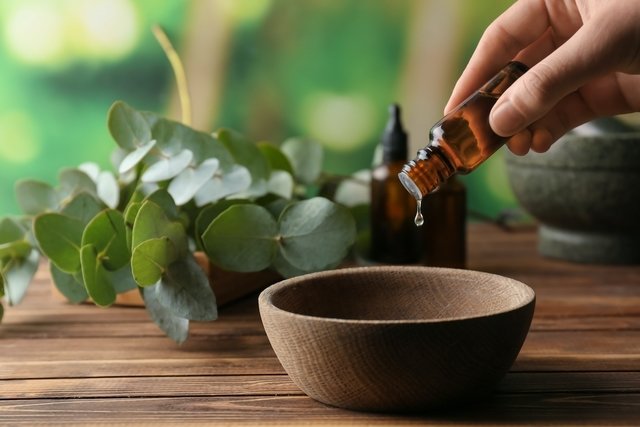Some home remedies such as eucalyptus essential oil, ginger tea or nettle tea can help improve the symptoms of rhinitis, as they are rich in antioxidant, anti-inflammatory and immunostimulant substances that strengthen the body’s natural defenses and help to eliminate phlegm.
Rhinitis is inflammation of the nasal mucosa, generally caused by an allergy to dust, dust mites or dander, tree or flower pollen, pollution or smoke, causing the release of histamine in the body, a substance responsible for the symptoms of rhinitis. Find out all the symptoms and causes of rhinitis.
Although home remedies do not guarantee a cure for rhinitis, they can help alleviate symptoms and prevent the emergence of new attacks, being an excellent way to complete the treatment recommended by your doctor.

1. Eucalyptus essential oil
Eucalyptus essential oil has eucalyptol in its composition, a substance with anti-inflammatory action on the respiratory tract, which helps reduce the production and facilitates the elimination of phlegm, which causes a blocked nose and runny nose.
This essential oil should only be used for inhalation and should not be consumed orally.
Ingredients
- 3 to 5 drops of eucalyptus essential oil;
- 1 liter of boiling water.
Preparation mode
Add drops of eucalyptus essential oil to boiling water. Then, cover your head with an open towel, so that it also covers the container containing the eucalyptus essential oil solution. Tilt your head over the container and breathe in the steam for 10 minutes. This towel helps keep the solution vapor for longer.
Eucalyptus essential oil should not be used by children and pregnant or breastfeeding women. Additionally, some people may be sensitive to eucalyptus oil, especially people with some type of respiratory allergy or asthma. Therefore, if rhinitis symptoms worsen, there is an intense cough or difficulty breathing, it is recommended to avoid using eucalyptus essential oil.
Ginger and garlic tea has antioxidant and anti-inflammatory properties due to allicin, present in garlic, and phenolic compounds such as gingerol, chogaol and zingerone, from ginger, which help combat the symptoms of rhinitis such as stuffy nose, runny nose, pain throat and general discomfort.
Furthermore, this tea helps to strengthen the immune system and shorten the duration of rhinitis.
Ingredients
- 3 cloves of garlic, peeled and cut in half;
- 1 cm of ginger root or ½ teaspoon of powdered ginger;
- 3 cups of water;
- Honey to sweeten (optional).
Preparation mode
Boil water with garlic. Remove from heat and add ginger and honey. Strain and serve afterwards.
Ginger should not be consumed by people using anticoagulants, and therefore should be removed from the tea in these cases.
3. Peppermint tea
Peppermint tea is rich in menthol, an essential oil that helps improve symptoms of runny nose, stuffy nose, headache and cough, common in rhinitis.
Furthermore, this tea has anti-inflammatory properties, which help reduce inflammation in the airways, relieving the symptoms of rhinitis.
Ingredients
- 6 chopped peppermint leaves;
- 150 mL of boiling water.
Preparation mode
In a cup, add the water over the chopped mint leaves and let it rest for 5 to 7 minutes. Strain, sweeten with honey if desired and drink 3 to 4 cups a day.
4. Apple cider vinegar
Apple cider vinegar has polyphenols in its composition with antioxidant and anti-inflammatory properties, which help to strengthen the immune system and combat inflammation of the respiratory tract, being very useful for reducing the symptoms of rhinitis such as a stuffy nose, runny nose or cough, for example. example.
Ingredients
- 1 to 2 tablespoons of apple cider vinegar;
- 1 glass of water.
Preparation mode
Add apple cider vinegar to the glass of water and mix. Drink 1 glass, 20 minutes before breakfast, lunch or dinner.
It is important to rinse your mouth with water after drinking the apple cider vinegar solution and, to prevent tooth enamel from wearing away, you should brush your teeth 30 minutes after drinking the solution.
Apple cider vinegar can also be used throughout the day to season salads, for example.
5. Thyme infusion
Thyme infusion is rich in anti-inflammatory and antioxidant substances, such as thymol, carvacrol, cymene and linalool, with expectorant action, which allows the elimination of phlegm and relieves runny nose and the feeling of a stuffy nose caused by allergic rhinitis.
Ingredients
- 1 tablespoon of dried thyme extract or 2 sprigs of fresh thyme;
- 1 liter of boiling water.
Preparation mode
Add the dried thyme to the boiling water and let it rest for 5 to 10 minutes. Strain and drink up to 3 cups per day.
Thyme infusion should not be used by people with stomach problems such as gastritis or ulcers, by people with liver disease or who use anticoagulant medications such as warfarin or clopidogrel, for example.
6. Nettle tea
Nettle tea blocks the effects of histamine in the body, the substance responsible for the inflammatory response in cases of allergies. Therefore, drinking this tea throughout the day helps to alleviate the symptoms of allergic rhinitis, especially the runny nose, itching and the feeling of a stuffy nose.
Ingredients
- 2 coffee spoons of chopped nettle leaves;
- 200 mL of water.
Preparation mode
Boil the water and add the nettle leaves, then let it rest for 10 minutes, strain and drink 3 to 4 cups of tea per day.
Another option is to take nettle capsules in a dose of 300 to 350 mg, 2 to 3 times a day.
Nettle tea should not be used by children, pregnant or breastfeeding women, or by people with heart disease or impaired kidney function.

Sign up for our newsletter and stay up to date with exclusive news
that can transform your routine!
Warning: Undefined array key "title" in /home/storelat/public_html/wp-content/plugins/link-whisper-premium/templates/frontend/related-posts.php on line 12
Warning: Undefined array key "title_tag" in /home/storelat/public_html/wp-content/plugins/link-whisper-premium/templates/frontend/related-posts.php on line 13



